Relentless repression in Russia: why we will demonstrate on Saturday 19 January
People and Nature
14 January 2019
On Saturday, January 19, we will demonstrate in London in solidarity with Russian antifascists. Eleven of them, who have been arrested, tortured, and accused of fabricated “terrorism” charges, are awaiting trial. Many others have faced a relentless campaign of persecution by officers of the Federal Security Service (FSB) and the police, as summarized in the following article.
Please join us on Saturday to support the Russian antifascists and strengthen international solidarity against fascism, xenophobia, and state terror. Please repost and share this article.
Details of our London event here.
2018 summary
By Misha Shubin, 31 December 2018 (Original Russian text here)
I’ve also decided to sum up the year. Not my own year, but rather to remember what happened to anarchists and leftists in Russia in 2018. This post will be long, and many of you know or heard something about the events I recount here.
But I think it is very important not to forget all this. [Note. Links from the original article to Russian-language sources are included. Links to English translations or relevant articles in English added where available. Translator.]
The Network Case
Eleven anarchists and antifascists have been arrested. They are accused of setting up a terrorist group and planning terrorist attacks. According to the Federal Security Service (FSB), they wanted to organise an armed uprising in Russia.
Almost all the evidence has been gathered on pain of torture. The detainees were beaten up. Some of them were tortured using shocks from a stationary electric dynamo, others with tasers. At least one of the accused, Dmitry Pchelintsev, was hung upside down.
The accused are Yegor Zorin, Ilya Shakursky, Vasily Kuksov, Dmitry Pchelintsev, Arman Sagynbayev, Andrei Chernov, Viktor Filinkov, Igor Shishkin, Yuli Boyarshinov, Mikhail Kulkov, and Maksim Ivankin.
What to read:
“How the FSB is manufacturing a terrorist case against antifascists in Russia”
What else you need to know about this case:
“A witness in the ‘network’ case, Ilya Kapustin, was tortured with a hand-held electric shocker.” Subsequently, he left for Finland, where he has applied for political asylum.
Viktoria Frolova, Ilya Shakursky’s girlfriend, was detained on Russia’s border with Ukraine. (Link in Russian.) Shakursky was threatened that “it would be bad” for his girlfriend if he did not make a confession.
The case of anarchist Yevgeny Karakashev
In early February 2018, anarchist Yevgeny Karakashev was arrested in Crimea [the peninsula annexed by Russia from Ukraine in 2014]. They brought him to the police station with a bag over his head. There were fresh bruises on his temples and his knees. On the basis of
two videos that he had uploaded to various chat forums, he was accused of making public calls for terrorist activity.
What to read:
“A rifle stock to the heart, a fist to the gut: how left-wing activists are persecuted in Crimea”
(And more in Russian.) [And a report of Karakashev’s subsequent court appearance is here.]
What else you need to know about this case:
The main prosecution witness is a former comrade of Karakashev’s.
In the autumn, 16 people from various Russian regions were summoned to the Russian Investigative Committee for interrogations. Many of them have expressed left-wing views. Some of them did not even know Karakashev.
Torture of anarchists in Chelyabinsk
Anarchists in Chelyabinsk staged an event on the night of 14–15 February in solidarity with the Network Case defendants. They displayed a banner outside the FSB headquarters and threw a flare over a fence. The banner read, “The FSB is the chief terrorist.”
Three days later, five people were arrested: Dmitry Semenov, Dmitry Tsibukovsky, Anastasia Safonova, Maksim Anfalov, and their friend Maksim. Tsibukovsky and Anfalov were beaten up and tortured with electric shockers.
Over the summer, the criminal case against theChelyabinsk anarchists was dropped.
What to read:
“The main thing at that moment, in that situation, was to come out alive”
What else you need to know about this case:
In November, a new criminal case was opened against anarchists Tsibukovsky, Safonova, Grigory Potanin, Mikhail Perkov, and Dmitry Dubovoi. This time, they were charged with vandalism during their protest of the government’s pension reform.
The broken window in United Russia’s office and torture of Svyatoslav Rechkalov
On 31 January, persons unknown broke a window at the office of United Russia [the largest party in the Russian parliament, which supports President Putin] and threw a smoke bomb. A criminal investigation into vandalism was launched. Sixteen days later, Yelena Gorban and Aleksei Kobaidze were arrested. After questioning, they were released on their own recognizance.
On 14 March, searches were conducted of the homes of anarchists from the People’s Self-
Defence organisation in connection with the case. Subsequently, Svyatoslav Rechkalov and Andrei were detained; the latter, most likely, was released.
Rechkalov was driven around the city for several hours, blindfolded. Then security services officers beat him and tortured him with electric shocks. They warned that, if he did not make the necessary confession, he would end up a defendant in the Network Case. After being tortured, Rechkalov was released. He emigrated to France.
What to read:
“The horror continues”, and “They put a bag on my head, cuffed my hands behind my back and tortured me with a taser”.
What else you need to know about this case:
In November, Rechkalov started getting threats from the FSB. (Link in Russian.)
Torture of Left Bloc activist Maksim Shulgin
In late April, Left Bloc activist Maksim Shulgin was detained in Tomsk. On the way to his interrogation, security service officers beat him up in their vehicle and held his face against a heater. To protect his face from burns, Shulgin put his arms against the heater
and received first- and second-degree burns. Shulgin was accused of inciting hatred towards the police after posting songs on VK [a Russian social network similar to Facebook].
Shulgin filed a complaint about his having been tortured. In late December, he was again detained. This time, law enforcers tried to choke him to force him to withdraw the accusations he had made against FSB officers.
What to read:
Arrest in April. “Is Maxim Shulgin An Extremist?” and “Tomsk resident tortured for posting songs about police on VK.”
Torture in December. (Link in Russian.)
What else you need to know about this case:
Another nine Left Bloc activists were detained with Shulgin. They were forced to make confessions under threat of torture. (Link in Russian.)
Explosion in Arkhangelsk, interrogation of anarchists and leftist activists, and torture of Vyacheslav Lukichev
On 31 October there was an explosion at the FSB headquarters in Arkhangelsk, set off by Mikhail Zhlobitsky [who died at the scene]. As a result, all over Russia the police detained and brought anarchists, left-wingers, and those who hold alternative political views in for so-called discussions. (Link in Russian.)
In early November, anarchist Vyacheslav Lukichev was arrested in Kaliningrad. He was accused of vindicating the explosion set off by Zhlobitsky. It was later established that after Lukichev’s arrest he was beaten by six people. He was questioned for 36 hours.
What to read:
“Vyacheslav Lukichev: interrogated for 36 hours and beaten”
What else you need to know about this case:
After the explosion, a 14-year old who, allegedly, had contact with Zhlobitsky was detained in Moscow on suspicion of planning bombings. (Link in Russian.)
What else happened this year?
■ In March, the police checked the documents of participants in a football tournament organised by antifascists. (Link in Russian.)
■ In July, police and FSB officers went to the Pryamukhino Readings [an event held annually to discuss the ideas and legacy of Mikhail Bakunin, at his birthplace in Tver Region]. The conference theme was “Revolution and Culture”. The security service officers checked participants’ passports, and then detained Artem Markin, an anarchist from Belarus. He was detained for three days for allegedly using psychotropic substances. See: “A Funny Thing Happened in Pryamukhino”.
■ In August, officers from Centre “E” [Center for Combating Extremism] turned up at the Icebreaker [Ledokol] punk festival. They arrested two people, tried to persuade them to turn informer, and asked about the People’s Self-Defence group. (Link in Russian.)
■ In October, anarchist Ilya Romanov was sentenced to five-and-a-half years on charges of incitement to terrorism. He allegedly published on Facebook a video recording of jihadists and an occult ritual featuring a puppet named Vladimir. All the indications are that the criminal case was a frame-up. See: “Meet Russian anarchist Ilya Romanov. He’s spent nearly twenty years in prison”.
■ In late December, the anarchist Aleksandr Kolchenko [from Crimea, who since 2015 has been serving a ten-year sentence in Russia on trumped-up charges] was transferred, on a formal pretext, to a punitive isolation cell, where he saw in the new year. (Link in Russian.)
Moloko plus siloviki
[Moloko is Russian for “milk”. Siloviki is a widely used term for the heads and officers of Russia’s numerous, overlapping security services, including the FSB, Centre “E”, the Russian National Guard, and the Russian Investigative Committee.]
In mid June, there was a gathering in Krasnodar of members of the collective that publishes the countercultural almanac moloko plus. Sofiko Arifdzhanova and Pavel Nikulin had planned to present the latest issue of the almanac, on the topic of revolution. On the day before the event, the police arrested Sofiko and a volunteer [who helped with printing], Anastasia Kkhukhurenko. The police would not release them and demanded a meeting with Pavel. They then forced Sofiko and Anastasia to sign an undertaking not to organise unauthorised mass gatherings and warned them about the punishments for extremist activity before releasing them
The next day, persons unknown attacked Sofiko and Pavel with pepper spray. A few hours later, at the presentation, the police arrived and confiscated almanac’s print run.
In September, there was another presentation, in Petersburg, and FSB officers turned up. In this case, everything turned out relatively peacefully. They just got up and left.
After another two weeks, there was a presentation here in Nizhny Novgorod. A few minutes after it began, officers from Centre “E” burst in, with armed back-up. Sofiko, Pavel, and I were arrested and taken to the police station. Ninety copies of the almanac were confiscated, along with some gas cylinders [sic]. Pavel was detained for two days on charges of insubordination to a police officer. The issue of moloko plus is now being checked for any indications of extremism. There is a big text about our adventures in Russian here.
I am sure I have forgotten something and so not included it. Generally speaking, that was the sort of year we had.
More on defending Russian political prisoners:
■ “Convoyed”, on The Russian Reader
Thanks to People and Nature for their generous permission to republish this important article and solidarity appeal here. I have lightly edited the original text to make it hew more closely to this website’s imaginary style guide. {TRR}
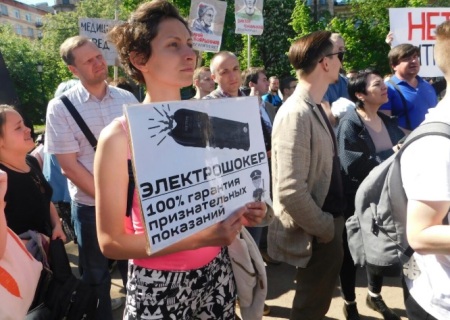



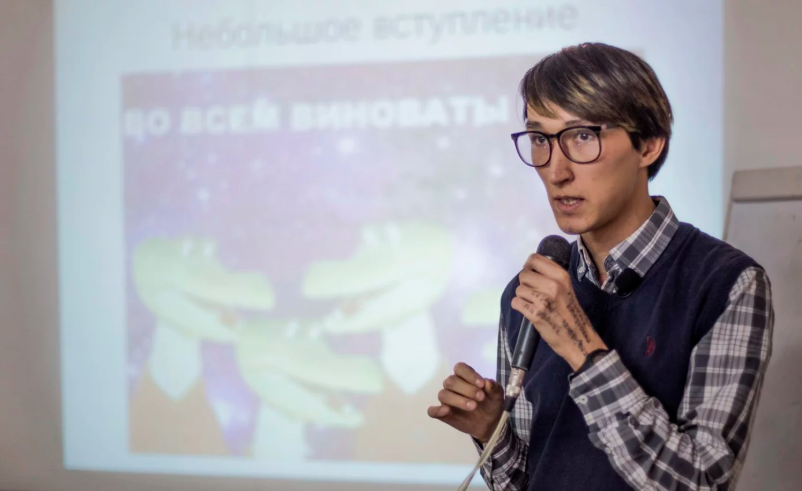 Arman Sagybayev. Photo courtesy of Mr. Sagynbayev and Mediazona
Arman Sagybayev. Photo courtesy of Mr. Sagynbayev and Mediazona
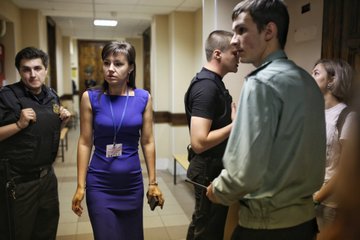
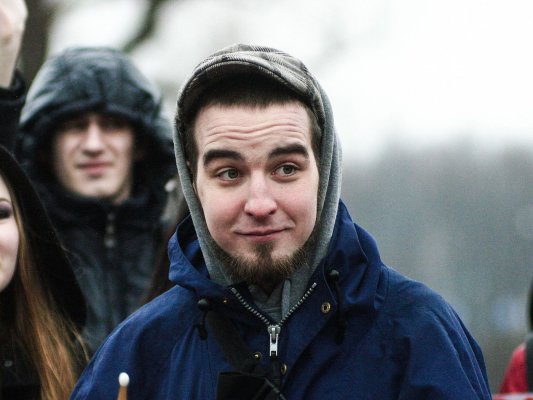 Yuli Boyarshinov, 2015. Photo by Maria Shuter. Courtesy of OVD Info
Yuli Boyarshinov, 2015. Photo by Maria Shuter. Courtesy of OVD Info Yuli Boyarshinov. Photo courtesy of Mr. Boyarshinov’s friends and OVD Info
Yuli Boyarshinov. Photo courtesy of Mr. Boyarshinov’s friends and OVD Info Yuli Boyarshinov. Photo courtesy of Mr. Boyarshinov’s friends and OVD Info
Yuli Boyarshinov. Photo courtesy of Mr. Boyarshinov’s friends and OVD Info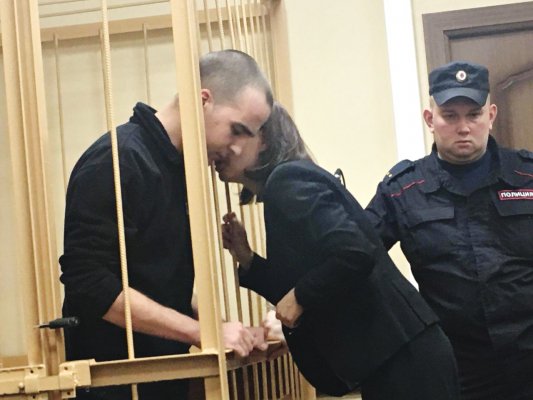 Yuli Boyarshinov and defense attorney Olga Krivonos at a custody extension hearing on February 19 in Primorsky District Court. Photo courtesy of Ms. Krivonos and OVD Info
Yuli Boyarshinov and defense attorney Olga Krivonos at a custody extension hearing on February 19 in Primorsky District Court. Photo courtesy of Ms. Krivonos and OVD Info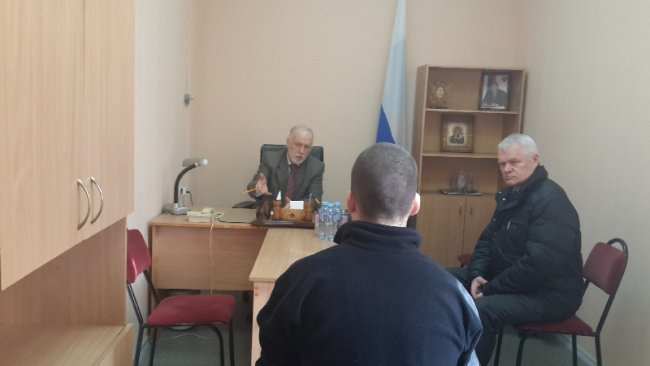 Visit by Leningrad Region Human Rights Ombudsman Sergei Shabanov to Gorelovo Remand Prison. Yuli Boyarshinov sits with his back turned to the camera. Photo courtesy of Remand Prison No. 6 website and OVD Info
Visit by Leningrad Region Human Rights Ombudsman Sergei Shabanov to Gorelovo Remand Prison. Yuli Boyarshinov sits with his back turned to the camera. Photo courtesy of Remand Prison No. 6 website and OVD Info In Finland
In Finland Screen shot of the message posted about Viktor Filinkov’s arrest on the Telegram channel of the Joint Press Service of the St. Petersburg Courts, January 25, 2018
Screen shot of the message posted about Viktor Filinkov’s arrest on the Telegram channel of the Joint Press Service of the St. Petersburg Courts, January 25, 2018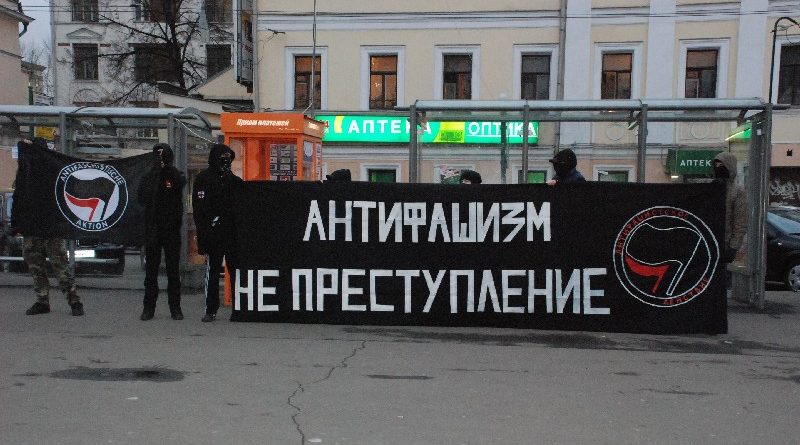 “Antifascism is not a crime.” Photo courtesy of
“Antifascism is not a crime.” Photo courtesy of 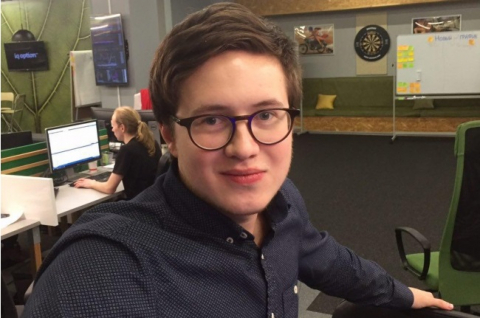 Viktor Filinkov, Petersburg antifascist, torture victim and political prisoner
Viktor Filinkov, Petersburg antifascist, torture victim and political prisoner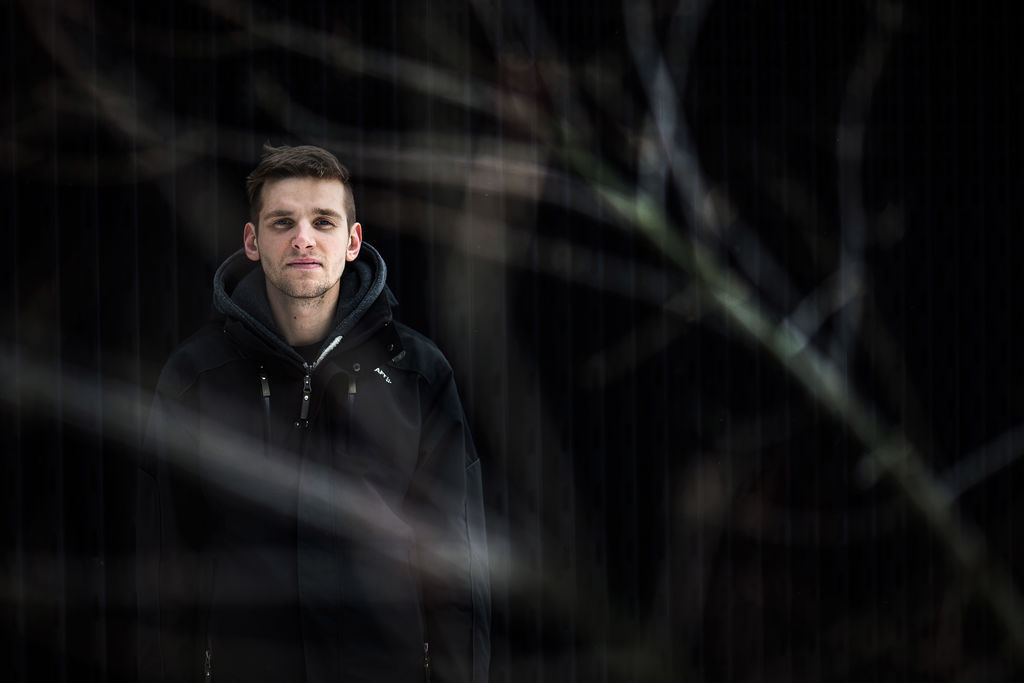 Russian activist Ilya Kapustin has fled to Finland, where he is currently seeking asylum. Photo by Pasi Liesimaa. Courtesy of Iltalehti
Russian activist Ilya Kapustin has fled to Finland, where he is currently seeking asylum. Photo by Pasi Liesimaa. Courtesy of Iltalehti
 Ilya Shakursky. Photo from personal archive and courtesy of Mediazona
Ilya Shakursky. Photo from personal archive and courtesy of Mediazona
I was in the vehicle from roughly nine-thirty in the evening to one-thirty in the morning, when we arrived, apparently at an FSB office. When they took me out, they pulled a hood over my head and forced me to look down, and I could not figure out where we were, but later, when they took me home to search my flat, I guessed that it was a corner on Shpalernaya Street of the FSB building [whose main entrance is on Liteiny Avenue in downtown Petersburg—TRR]. I saw just as many secret service people in the office, only they were not wearing and were dressed in plain clothes. An investigator questioned me for something like an hour. Other secret service guys would sometimes stop by. One of them told me that if I did not want a second round, I should answer all the questions.
Then we went to the flat where we live, and there they let us read a search warrant issued by a court in Penza. During the search, I refused to switch on my laptop and telephone. That made them act very stridently. They threatened to hide a grenade and come back in a couple of days and find it in a search. Ultimately, they confiscated my laptop, telephone, and hard drive.
When they left, I went to the emergency room and documented the fact I had been beaten. I was issued a certificate in which all my injuries are listed. I am now looking for a lawyer to file a complaint. I am not mixed up in anything, but out of the blue I was tortured for several hours.
Translated by the Russian Reader